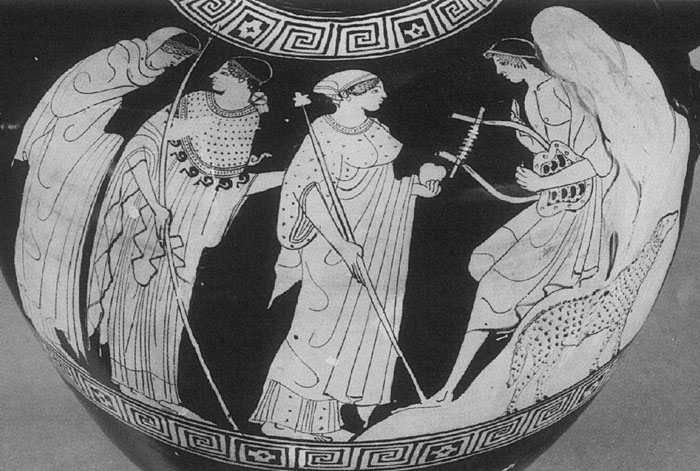 Figure to right: The Judgment of Paris.
Figure to right: The Judgment of Paris.Ancient intellectuals protested the immoral behavior of the gods in the traditional myths. For example, Pindar (Oly. IX) says, “Hateful is the poets’ lore that speaks slander against the gods.” And in the Theaetetus (176b) we read, “In God there is no sort or kind of unrighteousness.” Plotinus (VI.25) identified the Good with the One, and although other Neoplatonists identified the Good with lesser hypostases, it is still high in the hierarchy. What can evolutionary neuroethology and Jungian psychology tell us about this issue?
The archetypal structures encoded in the human genome have conferred selective advantage on our species in its environment of evolutionary adaptedness. They have promoted the survival of our species, and in this abstract sense, the anthropomorphic gods may be called “good” for humans. However, I think it is more accurate to consider the gods to be “beyond good and evil.” This is the conclusion of Jungian psychology, and less likely to mislead us than highly rarified notions of “the Good.” The gods serve their own ends, which may not be ours, and their inclinations may not conform to contemporary standards of morality, or promote our individual interests.
Further, we must not forget that behind the gods are the unpersonified archetypal Ideas, which correspond to natural and mathematical law, and which cannot be called “good” even in the sense of promoting H. sapiens. It is extremely parochial, I think, to suppose that universal Providence is directed toward what we take to be the well being of one species on one small planet, let alone toward the individual interests of you or me.
 Figure to right: The Judgment of Paris.
Figure to right: The Judgment of Paris.
Finally, we cannot forget that the archetypal gods may be in conflict. In biological terms, a stimulus may trigger conflicting instincts, such a fight and flight; in psychological terms, we may find ourselves in the grips of incompatible archetypes, warring gods or daimôns; such an existential dilemma is represented in the Judgment of Paris. Deities may have differing demands, and there may be no ethical basis for choosing among them. Our best option may be to negotiate with them to find a resolution balancing all their demands, for which theurgy can be useful.
Nevertheless, wisdom is living in harmony with divine Providence (our “phylogenetic destiny”), for this is what gives meaning and significance to life, and so we must contemplate what that entails (Stevens 1982, 140–2, 293–5).
(continue to next page) Return to MacLennan’s home page
Return to MacLennan’s home page Send mail to Bruce MacLennan / MacLennan@cs.utk.edu
Send mail to Bruce MacLennan / MacLennan@cs.utk.edu
 This
page is www.cs.utk.edu/~mclennan/papers/EJT/IVO.html
This
page is www.cs.utk.edu/~mclennan/papers/EJT/IVO.html